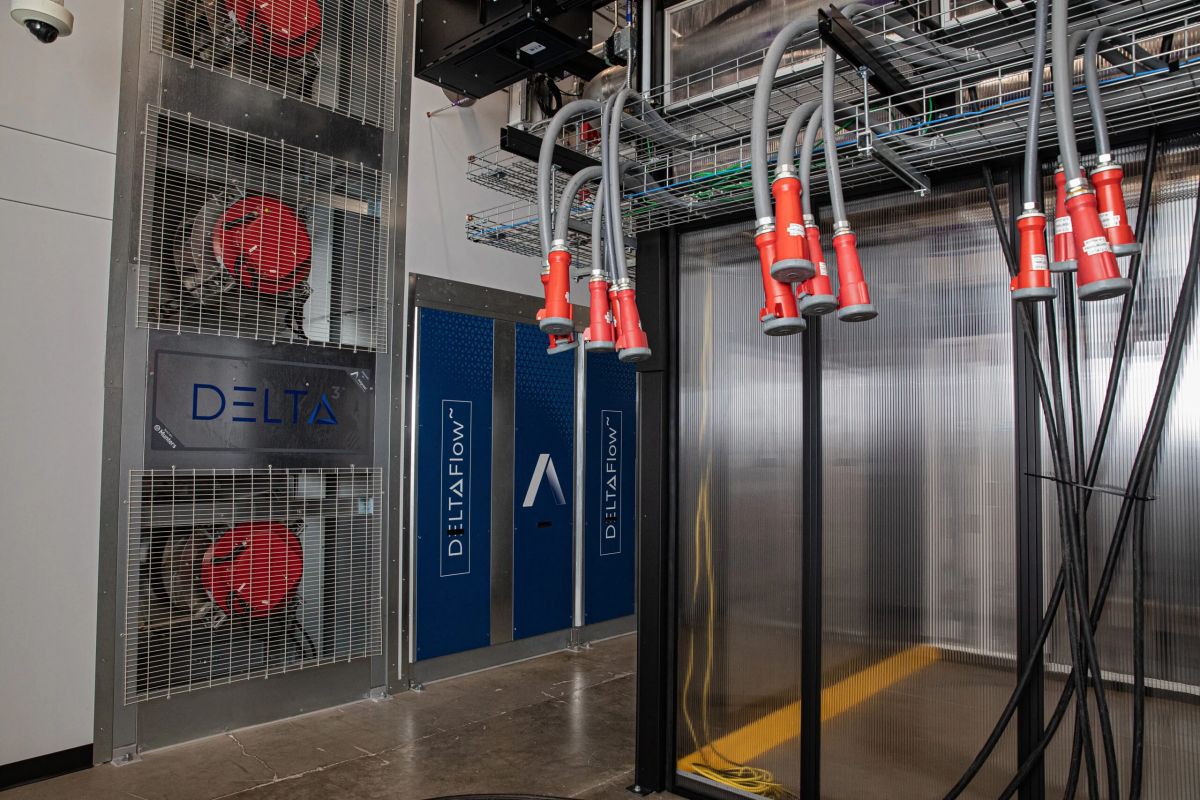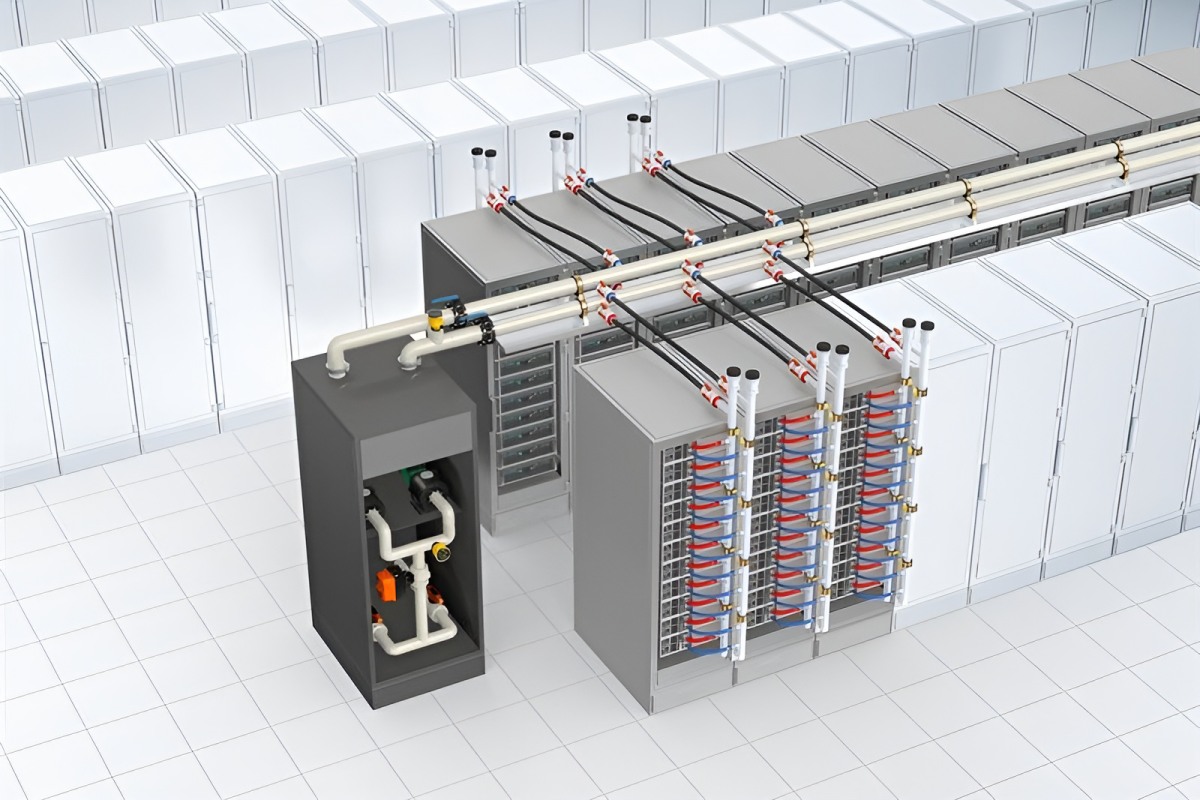Data Centre Infrastructure News & Trends
Data Centre Infrastructure News & Trends
Enterprise Network Infrastructure: Design, Performance & Security
News
Products
Riverbed launches new network observability tools
Riverbed, a US-based provider of network performance monitoring, application management, and WAN optimisation software and hardware, has launched a new range of AI-powered network observability tools, aimed at helping enterprise IT teams manage increasingly complex environments.
The latest updates include new hardware, enhanced software, and a more flexible licensing model, designed to support high-performance, AI-ready infrastructure.
The new release features the Riverbed xx90 appliance family, reportedly delivering up to three times the performance of previous systems for AppResponse, NetProfiler, and Flow Gateway.
The appliances are built for high-throughput packet and flow capture across distributed networks, supporting monitoring at over 50Gbps and offering scalable storage beyond 2.4PB.
AppResponse 11.21 now enables real-time analysis of encrypted IPSec ESP tunnel traffic and cipher hygiene, while the new version of NetProfiler (10.29), according to the company, brings faster reporting, dynamic flow balancing, and support for Versa SD-WAN.
The release also introduces the Riverbed Intelligent Network Observability Essentials bundle, combining key tools for hybrid environments:
• Riverbed IQ – AI-powered diagnostics for issue detection and resolution
• Workspaces – Role-based dashboards integrating packet, flow, and endpoint data
• Grafana plug-in – Allows Riverbed data to be displayed in existing Grafana dashboards
• Topology Viewer – Map-based visualisation of networks, applications, and user experience
These features are available through the company's Riverbed Flex Subscription. The model, they claim, is intended to improve licensing flexibility, reduce total cost of ownership, and simplify long-term planning.
“With today’s launch, we’re introducing next-generation observability systems that align with what our customers need: streamlined toolsets, automation, and cost-efficient performance,” says Dave Donatelli, CEO of Riverbed.
“We’re delivering these capabilities with faster appliances, smarter software, and greater flexibility.”
Riverbed reports 92% year-on-year growth in observability bookings for the first half of 2025.
“As organisations prepare their infrastructure for AI and data-heavy applications, they need monitoring systems that are intelligent and built to scale,” adds Shamus McGillicuddy, Research Vice President at EMA.
Joe Peck - 5 August 2025
Cabling Solutions for Optimised Data Centre Performance
Data Centre Infrastructure News & Trends
Data Centres
Products
Scolmore introduces IEC Lock C21 Locking Connector
Scolmore, a UK-based manufacturer of electrical wiring accessories, circuit protection products, and lighting equipment, has expanded its IEC Lock range with the addition of a new C21 locking connector, compatible with both C20 and C22 inlets.Featuring a side button release, the IEC Lock C21’s design aims to offer extra protection against accidental disconnection, making it an appropriate choice for applications where reliability is essential.Designed to handle the heat, the company says the C21 is a durable, lockable connector built to protect appliances that are sensitive to vibration against power loss.
The product is particularly suited to data centres, servers, and other industrial equipment where maintaining the proper device temperature is critical to operational success.
Joe Peck - 5 August 2025
Data Centre Infrastructure News & Trends
Enterprise Network Infrastructure: Design, Performance & Security
News
AssetHUB, ITS to speed up fibre rollouts in UK cities
Organisations looking to deliver high-speed connectivity in major cities across the UK have been given a boost following a new partnership between asset reuse specialist AssetHUB and full fibre networks provider ITS.
The collaboration will allow Altnets and other interested parties, such as enterprise businesses, government units, local council and carriers, to purchase ITS’s dark fibre assets through AssetHUB’s secure marketplace for buying and selling existing infrastructure.
The companies say the addition reflects a "shared commitment to enabling faster, more efficient fibre deployments through smarter infrastructure planning and reuse."
“Fibre rollouts in big cities often mean weeks of roadworks, noise, and many other disruptions, which frustrate residents and obstruct already busy streets,” says AssetHUB CEO Rob Leenderts.
“Through collaboration and sharing of assets in big cities, Altnets and other fibre builders can avoid unnecessary dig costs and overbuild, as well as speed up deployments to businesses and other amenities that require urgent connectivity upgrades.
"Having a centralised platform that clearly maps infrastructure or product availability in dense locations and streamlines asset enquiries can also help network builders decrease the time to market of their services.”
Kevin McNulty, Strategy Director at ITS, adds, “Our strategic partnership with AssetHUB is an important step in our ambition to scale through collaboration.
"By making our infrastructure discoverable to other parties at the point of planning, we’re supporting faster rollouts, reduced disruption, and greater visibility of critical fibre routes in some of the UK’s most in-demand urban areas.”
The partnership also enables ITS to utilise AssetHUB’s marketplace as a buyer, sourcing infrastructure assets to support its own build and expansion plans.
Joe Peck - 5 August 2025
Data
Data Centre Infrastructure News & Trends
Enterprise Network Infrastructure: Design, Performance & Security
News
365 Data Centers, Megaport grow partnership
365 Data Centers (365), a provider of network-centric colocation, network, cloud, and other managed services, has announced a further expansion of its partnership with Megaport, a global Network-as-a-Service provider (NaaS).
Megaport has broadened its 365 footprint by adding Points of Presence (PoPs) at several of 365 Data Centers’ colocation facilities - namely Alpharetta, GA; Aurora, CO; Boca Raton, FL; Bridgewater, NJ; Carlstadt, NJ; and Spring Garden, PA - enhancing public cloud and other connectivity systems available to 365’s customers.
Said customers will now be able to access DIA, Transport, and direct-to-cloud connectivity options to all the major public cloud hyperscalers - such as Amazon Web Services (AWS), Microsoft Azure, Google Cloud Platform (GCP), Oracle Cloud, and IBM Cloud - directly from 365 Data Centers.
“Integrating Megaport’s advanced connectivity solutions into our data centers is a natural progression of our partnership and network-centric strategy," comments Derek Gillespie, CRO at 365 Data Centers.
"When we’ve added to Megaport’s presence in other facilities, the deployments [have] fortified our joint Infrastructure-as-a-Service (IaaS) and NaaS offerings and complemented our partnership in major markets.
"Megaport’s growing presence with 365 significantly enhances the public cloud connectivity options available to our customers.”
Michael Reid, CEO at Megaport, adds, “Our expanded partnership with 365 Data Centers is all about pushing boundaries and delivering more for our customers.
"Together, we’re making cutting-edge network solutions easier to access, no matter the size or location of the business, so customers can connect, scale, and innovate on their terms.”
For more from 365 Data Centers, click here.
Joe Peck - 1 August 2025
Data Centre Infrastructure News & Trends
Data Centres
Innovations in Data Center Power and Cooling Solutions
News
Mayflex signs distribution agreement with Schleifenbauer
Mayflex, a UK-based distributor of converged IP infrastructure, networking, and electronic security products, has announced a new distribution agreement with Schleifenbauer, adding the Netherlands-based manufacturer’s power distribution units (PDUs) and energy management tools to the Elevate brand’s data centre infrastructure portfolio.
The partnership aims to support Mayflex’s ongoing focus on high-performance computing (HPC) and data centre (DC) environments, with a particular emphasis on providing equipment that is efficient, scalable, and compliant with European standards.
Schleifenbauer, which designs and manufactures its products in the Netherlands, will supply intelligent PDUs and related energy management software for integration into the Elevate range.
The collaboration hopes to enhance delivery times and flexibility, particularly for UK and Ireland customers.
Product and operational features
The partnership will see the inclusion of several features designed to improve operational performance and ease of use across data centre projects:
• European manufacturing — All Schleifenbauer equipment is produced in the Netherlands, allowing for consistent quality control, shorter lead times, and full EU regulatory compliance.
• Customisable production — The company offers a flexible manufacturing model with no minimum order requirements. This allows Mayflex customers to request individual units for trial projects, or bulk orders for larger-scale deployment, while maintaining consistent performance standards.
• Energy monitoring software — Schleifenbauer’s energy management platform is available at no extra cost. The software enables real-time monitoring and optimisation of energy usage across installations.
• Hot-swappable modules — PDUs include hot-swappable control components, enabling updates or maintenance without downtime.
• Short lead times — Schleifenbauer’s production model supports faster turnaround and delivery times, which Mayflex aims to leverage across the Elevate product range.
Comments from the companies
Simon Jacobs, Product Manager at Mayflex, says, “We’re excited to welcome Schleifenbauer as a technology partner to our Elevate brand. Their intelligent power solutions are a perfect fit for our growing data centre portfolio.
"The combination of European manufacturing, rapid lead times, and advanced features - like hot-swappable modules and free energy management software - makes this a compelling proposition for our customers.”
Stuart Edmonds, UK and Ireland Sales Manager at Schleifenbauer, adds, “Partnering with Mayflex is a strategic move that allows us to expand our reach in the UK and Ireland.
"Mayflex’s reputation for technical excellence and customer service aligns perfectly with our values. Together, we’re well-positioned to support the evolving needs of the HPC and data centre markets.”
Joe Peck - 31 July 2025
Data Centre Infrastructure News & Trends
Enterprise Network Infrastructure: Design, Performance & Security
News
Zayo Europe sees network expansion across UK and Germany
Network infrastructure provider Zayo Europe has reported a 61% increase in the total number of route miles it powers during the first half of 2025, compared to the second half of 2024.
The growth has been spread across multiple European markets, with notable increases in the UK (241%) and Germany (173%). The company has attributed part of this expansion to its partnership with GasLINE.
The figures reflect the momentum built since Zayo Europe became an independent entity in mid-2024. Since then, the company has focused on delivering network infrastructure across Europe’s complex and highly interconnected digital landscape.
A major part of Zayo Europe’s current strategy involves increasing connectivity between data centres. The company now connects 600 sites across the continent, supporting digital services used by businesses, enterprises, and consumers.
Alongside network expansion, Zayo Europe has also grown its workforce. Headcount rose by 10% during H1 2025, with roles added across delivery, customer service, finance, and internal operations.
Further expansion is expected in the second half of the year, following Zayo Europe’s full acquisition of the Emerald Bridge subsea cable. The system provides G.652D dark fibre and high-capacity wave services between the UK and Dublin, Ireland.
In the company's own words
Colman Deegan, CEO at Zayo Europe, claims, “We always viewed H1 2025 as a pivotal period for Zayo Europe, marking a full year since we established ourselves as an independent entity.
"While growth has always been a key success metric, the pace at which our best-in-class fibre infrastructure is now connecting data centres and points of presence across major European markets is especially encouraging as we look ahead to the remainder of 2025 and beyond.
“Our continued network expansion not only enhances our service capabilities but also empowers our customers with greater reach, flexibility, and resilience, enabling them to scale operations, optimise performance, and react to evolving demands with confidence.
“The growth achieved so far this year is testament to the strength and dedication of our team at Zayo Europe. Service excellence is in our DNA and is frequently cited as a driving force behind our ability to secure new partnerships and mission-critical connectivity projects.
"That said, we’re not standing still. We’re aiming to continue this momentum throughout the rest of the year and well into 2026.”
For more from Zayo Europe, click here.
Joe Peck - 31 July 2025
Data Centre Build News & Insights
Data Centre Infrastructure News & Trends
Enterprise Network Infrastructure: Design, Performance & Security
News
Quantum Computing: Infrastructure Builds, Deployment & Innovation
Sitehop, Red Helix testing quantum-ready encryption
Sitehop, a UK startup focused on quantum encryption, has announced its partnership with Red Helix, a network and security testing company, to bring advanced testing in-house and to "supercharge" the critical speed-testing of its encrypted data transmission, utilising a Teledyne LeCroy Xena system.
With support from a five-figure 'productivity grant' from South Yorkshire Mayoral Authority, Sitehop has invested in a Teledyne LeCroy Xena Loki 100G traffic-generation and testing platform, which enables bi-directional testing of sub-microsecond latency in 100Gbps networks.
Bringing testing in-house has also reportedly eliminated delays and risks in export and customs, which included a minimum two-week turnaround at more than £18,000 per testing cycle.
Previously, Sitehop relied on an outsourced facility in France, but the new UK-based set up enables them to complete testing in a single day, freeing the time of Sitehop’s engineering teams and boosting their productivity.
Sitehop uses the Xena Loki device to test and validate its Sitehop SAFEcore platform, capable of 835 nanoseconds latency at 100Gbps encryption.
The platform can support 4,000 concurrent connections, deploying "crypto-agile" encryption for use in sectors such as telecoms, financial services, government, and critical national infrastructure.
Testing with the Xena Loki device covers peak load conditions, burst traffic, error injection and fault recovery, and end-to-end encrypted traffic flows. Multi-stream stress tests, mixed protocol environments, and real-time encrypted traffic benchmarking are part of the processes.
According to the company, the "speed and accuracy" of the Xena Loki platform enables Sitehop to validate latency, throughput, packet-loss, and error-handling across different profiles.
This is important to prove the Sitehop SAFEcore platform has the necessary performance and resilience in high-bandwidth, low-latency environments and is ready for new use cases such as 5G backhaul, wearable security technology, and the evolution of post-quantum cryptography.
“Testing in this way is a strategic enabler for us, accelerating product release cycles and reducing the risk of field failure while providing clients with higher levels of confidence during procurement,” says Melissa Chambers, co-founder and CEO of Sitehop.
“This is a major selling-point for enterprise and critical infrastructure environments.”
“We are incredibly proud to be at the forefront of the next generation of British tech manufacturing and believe we are part of a resurgence of innovation in the UK. We are proving that deep tech, hardware innovation, and cyber resilience can thrive here.
"As we expand globally and target high-assurance sectors, our ability to validate performance independently and rapidly becomes a cornerstone of our growth model. The grant we received has been hugely important, enabling us to bring a critical capability in-house that has accelerated our growth momentum.”
Baseline validation using the Xena Loki device is in line with the benchmarks RFC 2544 and Y.1564. In practice, however, the Sitehop SAFEcore system - the company claims - "frequently outperforms the scope of traditional methodologies, requiring custom profiles including simulated threat-scenarios, multi-session encrypted traffic under dynamic key exchange, and adaptive stream-shaping."
Liam Jackson, Director of Technology Solutions at Red Helix, comments, “We are thrilled to work with Sitehop, an exciting start-up company demonstrating that hardware-based security innovation is alive and well in the UK.
"Testing quantum-ready security platforms requires precise accuracy, reliability, and sustained high-speed throughput, which software-only traffic-generation tools can struggle to deliver.
"Sitehop understands this, and by harnessing the hardware-based Teledyne LeCroy Xena Loki platform, it hugely accelerates essential testing, gaining the speed, precision, and confidence to bring its cutting-edge solutions to market faster without impacting quality.”
Joe Peck - 30 July 2025
Data Centre DCIM Solutions & Best Practices
Data Centre Infrastructure News & Trends
Data Centres
News
Mitsubishi partners with Modius
Japanese multinational engineering company Mitsubishi Heavy Industries (MHI) has signed an agreement with US-based Modius to integrate its OpenData data centre infrastructure management (DCIM) platform with MHI’s power, cooling, and control technologies.
The collaboration will focus on delivering a comprehensive offering for data centre energy management (DCEM) on a global scale.
Modius’s OpenData DCIM software provides real-time visibility into critical infrastructure, supporting improved capacity planning, energy efficiency, and uptime.
The platform has been deployed in over 250 sites worldwide and includes AI/ML-based analytics to support proactive maintenance and operational optimisation.
The integration of Modius’s platform into MHI’s data centre portfolio seeks to enhance the company’s ability to offer customers real-time diagnostics, predictive insights, and greater control over facility performance.
The OpenData AI/ML module is designed to recognise normal operational patterns and flag anomalies early, allowing data centre operators to "respond before issues escalate."
“With the addition of the Modius DCIM platform to our digital portfolio, we can offer enhanced services to both existing and new customers seeking visibility and operational optimisation in next-generation data centres,” claims Shin Gomi, Senior General Manager, DCEM at MHI.
“MHI remains committed to supporting sustainable and energy-efficient infrastructure.”
Craig Compiano, President at Modius, adds, “MHI’s global presence and its alignment with our mission to drive efficiency, improve sustainability, and optimise performance in data centres make this collaboration a strong match. We look forward to working together to support facilities worldwide.”
Joe Peck - 29 July 2025
Data Centre Infrastructure News & Trends
Innovations in Data Center Power and Cooling Solutions
Liquid Cooling Technologies Driving Data Centre Efficiency
Aligned collaborates with Divcon for its Advanced Cooling Lab
Divcon Controls, a US provider of building management systems and electrical power monitoring systems for data centres and mission-critical facilities, has announced its role in the development of Aligned Data Centers’ new Advanced Cooling Lab in Phoenix, Arizona, where it served as the controls vendor for the facility.
The project marks a step forward in the design and management of liquid-cooled infrastructure to support artificial intelligence (AI) and high-performance computing (HPC) workloads.
The lab, which opened recently, is dedicated to testing advanced cooling methods for GPUs and AI accelerators. It reflects a growing need for more efficient thermal management as data centre density increases and energy requirements rise.
“As the data centre landscape rapidly evolves to accommodate the immense power and cooling requirements of AI and HPC workloads, the complexities of managing mechanical systems in these environments are escalating,” says Kevin Timmons, Chief Executive Officer of Divcon Controls.
“Our involvement with Aligned Data Centers' Advanced Cooling Lab has provided us with invaluable experience at the forefront of liquid cooling technology.
"We are actively developing and deploying advanced control platforms that not only optimise the performance of these systems, but also contribute to long-term sustainability goals.”
Divcon Controls has focused its work on managing the added complexity that liquid cooling introduces, including:
• Precise thermal control — Managing coolant flow, temperature, and pressure to improve heat transfer efficiency and reduce energy consumption.
• Integration with mechanical infrastructure — Coordinating the performance of pumps, heat exchangers, cooling distribution units (CDUs), and leak detection systems within a unified control framework.
• Load-responsive adjustment — Adapting cooling output in real time to match fluctuating IT loads, helping maintain optimal operating conditions while limiting energy waste.
• Visibility and predictive maintenance — Providing operators with detailed analytics on system performance to support proactive maintenance and longer equipment life.
• Support for hybrid environments — Enabling the transition between air and liquid cooling within the same facility, as demonstrated at Aligned’s lab.
As more facilities transition to hybrid and liquid-cooled architectures, Divcon Controls says it is focusing on delivering control systems that enhance energy efficiency, reduce operational risk, and ensure long-term asset reliability.
“Our collaboration with industry leaders like Aligned Data Centers underscores our commitment to innovation and to solving the most pressing challenges in data centre infrastructure,” continues Kevin.
“Divcon Controls is proud to be at the forefront of developing intelligent control platforms for the next generation of high-density, AI-powered data centres, with environmental performance front of mind.”
For more from Aligned, click here.
Joe Peck - 29 July 2025
Data Centre Infrastructure News & Trends
Innovations in Data Center Power and Cooling Solutions
Liquid Cooling Technologies Driving Data Centre Efficiency
GF introduces first-ever full-polymer Quick Connect Valve
The Quick Connect Valve 700 is a patented dual-ball valve engineered with the aim of enhancing safety, efficiency, and sustainability in Direct Liquid Cooling (DLC) systems.
The company claims that, "as the first all-polymer quick connect valve for data centre applications, it is 50% lighter and facilitates 25% better flow compared to conventional metal alternatives while offering easy, ergonomic handling."
As demand for high-density, high-performance computing grows, DLC is reportedly becoming a preferred method for thermal management in next-generation data centres.
By transporting coolant directly to the chip, DLC can improve thermal efficiency compared to air-based methods. A key component in this setup is the Technology Cooling System (TCS), which distributes coolant from the Cooling Distribution Unit (CDU) to individual server racks.
To support this shift, manufacturer of plastic piping systems, valves, and fittings GF has developed the Quick Connect Valve 700, a fully plastic, dual-ball valve engineered for direct-to-chip liquid cooling environments.
Positioned at the interface between the main distribution system and server racks, the valve is intended to enable fast, safe, and durable coolant connections in mission-critical settings.
Built on GF’s Ball Valve 546 Pro platform, the Quick Connect Valve 700 features two identical PVDF valve halves and a patented dual-interlock lever.
This mechanism ensures the valve can only be decoupled when both sides are securely closed, aiming to minimise fluid loss and maximise operator safety during maintenance. Its two-handed operation further reduces the risk of accidental disconnection.
The valve is made of corrosion-free polymer, which is over 50% lighter than metal alternatives and provides a UL 94 V-0 flammability rating.
Combined with the ergonomic design of its interlocking mechanism, the valve is, according to the company, easy to handle during installation and operation.
At the same time, its full-bore valve design seeks to ensure an optimal flow profile and a reduced pressure drop of up to 25% compared to similar metal products.
The product has a minimum expected service life of 25 years.
“With the Quick Connect Valve 700, we’ve created a critical link in the DLC cooling loop that’s not only lighter and safer, but more efficient,” claims Charles Freda, Global Head of Data Centers at GF.
“This innovation builds on our long-standing thermoplastic expertise to help operators achieve the performance and uptime their mission-critical environments demand.”
The Quick Connect Valve 700 has been assessed with an Environmental Product Declaration (EPD) according to ISO 14025 and EN 15804.
An EPD is a standardised, third-party verified document that uses quantified data from Life Cycle Assessments to estimate environmental impacts and enable comparisons between similar products.
For more from GF, click here.
Joe Peck - 28 July 2025

Head office & Accounts:
Suite 14, 6-8 Revenge Road, Lordswood
Kent ME5 8UD
T: +44 (0)1634 673163
F: +44 (0)1634 673173









